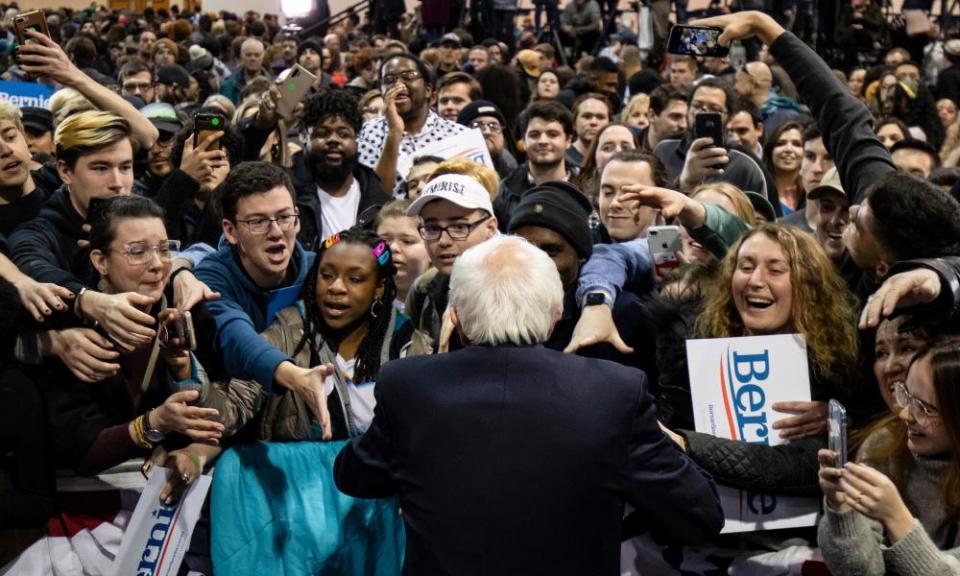Super Tuesday: Biden sets up Sanders showdown with South Carolina win

Joe Biden’s decisive victory in South Carolina on Saturday night has teed up a major showdown in the battle for the Democratic presidential nomination, as the race speeds towards the critical Super Tuesday vote and the former vice-president’s centrist rivals ponder whether to step aside.
Related: Mike Bloomberg addresses US in TV ad on coronavirus and Trump response
On Sunday evening, the first of them did: campaign officials confirmed to the Guardian that Pete Buttigieg, the former mayor of South Bend, Indiana, was out.
Biden delivered a landslide in the first southern state to vote, establishing himself as the main rival to frontrunner Bernie Sanders’ progressive campaign.
At a victory party in the state capital, Columbia, the former vice-president issued a thinly veiled dig at his opponent, a self-declared democratic socialist, as he urged voters to rally behind a “a lifelong Democrat, a proud Democrat, an Obama-Biden Democrat”.
He continued the charge on Sunday with appearances on major news shows in which he touted his legislative record in the Senate and the White House, repeating the same message: “The people aren’t looking for revolution. They’re looking for results.”
With less than 48 hours before the Super Tuesday ballot, in which 14 states and two other constituencies will decide more than a third of all the presidential delegates, Biden’s campaign still faces an uphill battle against Sanders.
For too long the Democratic party and leaders have … ignored the working class and the middle class
Bernie Sanders
The Vermont senator has raised vastly more money, crisscrossed the country to rally and spent more on TV advertising. Biden had focused almost entirely on South Carolina, appealing for support among black voters who make up a majority and who eventually carried him to victory after significant losses in the other early states.
Sanders came a distant second but still holds a small lead in the national delegate count after victories in New Hampshire and Nevada. He shot back at Biden on Sunday, describing himself as “an existential threat to the corporate wing of the Democratic party”.
“For too long the Democratic party and leaders have been going to rich peoples’ homes raising money and they’ve ignored the working class and the middle class,” Sanders told ABC’s This Week.
On CBS’s Face the Nation, he criticised Biden’s campaign for taking support from a super pac fundraising committee and mega-rich donors.
Saturday’s result also raised questions about the future of other centrist candidates. Buttigieg initially told NBC News he planned to continue fighting, as “Every day we are in this campaign is a day that we have reached the conclusion that pushing forward is the best thing we can do for the country and for the party”.
In the early evening, however, came the news that he was gone.
It is unlikely the Minnesota senator Amy Klobuchar will drop out before Tuesday, which is when her home state takes to the ballot box in a race that has also been targeted by Sanders.
Sanders is polling ahead in the delegate-heavy states of California and Virginia and is running close to Biden in Texas and North Carolina.
Despite this, Biden predicted he would see a strong showing on election night.
“I feel good about where we are,” he told Fox News Sunday. “It’s not for me to tell any other candidate they should get out of the race. They’ll know whether or not they remain viable, whether they have a chance. I’m confident that the primaries that are coming up and the ones that follow are going to whittle that field.”
Speaking to CNN’s State of the Union, Biden said he hadn’t had any conversations with other candidates but: “I think everyone knows it’s going to be much more difficult to win back the Senate and keep control of the House if Bernie’s at the top of the ticket.”

Super Tuesday also marks the first time the billionaire Mike Bloomberg will appear on the ballot. Despite two poor debates and Biden’s surge, the former New York mayor has shown no signs of leaving the race, having invested $500m of his personal fortune.
Bloomberg has bought a three-minute primetime advertising slot to be broadcast on two TV stations on Sunday, where he will make a presidential style address touting his leadership experience and criticising the Trump administration’s response to the coronavirus outbreak.
Related: Buzz of expectation as Bernie Sanders looks to blow away rivals on Super Tuesday
Biden reiterated on Sunday that he planned to push for the nomination if no single candidate secures the 1,991 pledged delegates needed to win the party’s presidential candidacy outright. Should that occur, the so-called super delegates, 771 senior Democratic figures who can decide for themselves who to back, could steer the nomination at a contested convention.
Sanders, striving to secure the 1,991 majority, staunchly opposes a contested convention.
“We need unity,” he told ABC. “If you reject the candidate who has the most votes from the people and you win it through super delegates and the Democratic establishment and the corporate wing of the Democratic party, do you think you’re going to have the energy and the excitement of a grassroots movement to defeat Donald Trump?”
Still, there are dozens of states and jurisdictions to vote before such an outcome becomes inevitable. Saturday’s result in South Carolina led to another candidate, billionaire Tom Steyer, dropping out of the race.
Steyer secured no delegates and came a disappointing third, having invested millions campaigning in the state.

